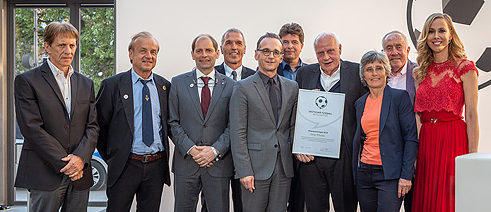German Football Ambassador
Well rounded

A “German with a Japanese heart” – who is better suited to be a German Football Ambassador than this man? People like Gert Engels show the difference football can make. Three of them have now been awarded.
This year, the German Football Ambassadors were announced for the sixth year in a row. And yet it’s a first: For the first time, the new Foreign Minister Heiko Maas has the honour of presenting the awards. It may even be one of his very first “ambassador appointments.” The time will come on Tuesday evening. At the Foreign Office in Berlin before around 200 guests, the honour will be given to three men. They will be able to call themselves German Football Ambassadors.
To honour the most dedicated of German coaches and footballers abroad is the goal of the Association of German Football Ambassadors. Among the previous awardees are Horst Kriete, Monika Staab, Miroslav Klose, Gernot Rohr, Jürgen Klinsmann and Mesut Özil. The Goethe-Institut is a partner of the initiative. According to Johannes Ebert, the secretary-general of the Goethe-Institut, football is of outstanding importance for intercultural dialogue. So for exactly what the Goethe-Institut stands for. “Football opens doors, but also stands for respect, tolerance and fairness,” said the self-confessed football fan at the award ceremony. “These are the qualities that also connect language and football.”
The first in the trio of this year’s honouree is Gert Engels. Like his two co-nominees Ernst Middendorp and Theo Brücker, he travelled from abroad especially for the award ceremony. The former Borussia Mönchengladbach midfielder has had a second home for a long time: Japan. It was in 1990 – Engels was studying at the Cologne Sport University – when a notice lured him to the land of the rising sun. After a short time as a player, he began his coaching career there, and was able to chalk up several championships and cup victories.
Since then, with interruptions, Engels has been active and influential in professional Japanese football. The most interesting of these interruptions may have been in 2011 when he became national coach in Mozambique for two years. But Engels, who just turned 61, has also remained faithful to his hometown of Düren. A few years ago, he founded the Soccer Life football school there, where up-and-coming talents from Japan are also always trained. Engels, for his part, has long since learned Japanese, he now speaks it fluently, his daughter has a Japanese name. He’s a German with a Japanese heart, says his boss Takayuki Yoshida.
This year, Engels became the assistant coach for the Vissel Kobe club, which, among other things, allows him to chase Lukas Podolski across the grass. “It’s always about being able to get by abroad, communicating with one another, conveying values like discipline. The Japanese may be more disciplined than we are, but they need to learn professionalism and mental strength,” Engels revealed recently to Kicker. Naturally, what matters is the message.
Engels also co-founded the project Future Local Genkids, which supports children affected by the Fukushima nuclear reactor disaster.
“You have to respect your opponent”
Otto Pfister is also a special kind of ambassador. Hardly anyone has worked in as many places as he. In 57 years, Pfister trained 24 club and national teams in 19 countries. He received this year’s honorary prize. He is by far the number one in the intercultural league of the football world, according to the high-calibre jury chaired by Kicker editor Rainer Holzschuh. Even at eighty, Pfister is still at the sidelines, presently coaching the Afghan national team. “To take on that responsibility in such a difficult country as Afghanistan merits special respect,” said Foreign Minister Maas at the ceremony. “The most important thing,” according to Pfister, “is to engage completely with the people and culture, mentality and religion. You have to respect your opponent, even if he has a completely different environment.”Finally, goalkeeper Loris Karius rounds off the winning trio. Karius, however, was chosen by the biggest jury: the fans. Almost 25, the Upper Swabian is a player with FC Liverpool and was chosen from among eleven candidates in an online vote. Karius has already played in various junior national teams, for two years he has been part of Jürgen Klopp’s squad – as was one of his predecessors: Emre Can received the Audience Award two years ago. Karius had a good excuse for not making it to Berlin personally: after all, Liverpool is in the Champions League finals. Instead, the footballer announced via video message, “Football has the power to bring people and cultures together. I am proud to be able to represent Germany as best as possible.”
-db/fg-